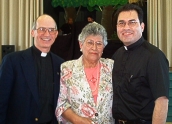Padre Pio’s Most Famous Penitent
(Homily for Thirteenth Sunday of Ordinary Time, Year A)
The prophet Elisha told an elderly, childless couple that within a year they would be holding a baby son. (2 K 4:16) In my ministry I once experienced a similar wonder. A young couple told me how they had tried everything, but could not conceive a child. After listening to them, I gave them a blessing and suggested they make a novena to St. Anthony.
About a year later I saw a young man walking next to our church with a child in his arms. He said, “Father, do you remember me?”
I admitted that I did not. He told me how I had prayed with him and his wife and told them about St. Anthony. “Here is the answer to our prayers. She is my treasure. Everything I ever wanted in life.”
Jesus tells us that if we honor a prophet, we will receive a prophet’s reward. And if we honor a saint, we will likewise receive recompense. (Mt 10:41)
Two weeks ago, three hundred thousand people gathered in Rome to honor one of the great holy men of the twentieth century - Padre Pio. He was the only priest in the history of the Church to receive the stigmata.* During his 58 years as a priest (1910-1968) he heard thousands of confessions. People came to him from all over the globe. He received the humble and the great with equal generosity – and sometimes with equal severity.
Of all his penitents, none is more famous than a recently ordained priest who sought the holy man in 1947. He had come from Poland to pursue doctoral studies in Rome. He made the long trip to San Giovanni Rotondo and spent several hours waiting in line. Stories have circulated about what the mystic told him.** Whatever transpired, it left a deep impression. The penitent referred to the confession two weeks ago when he proclaimed Padre Pio a saint. The young priest, as I am sure you guessed, later became Pope John Paul II.
Fr. Wojtyla took a risk when he traveled to San Giovanni Rotondo. Many ecclesiastics considered Padre Pio an embarrassment, a charlatan. From his early years people had spread rumors of fake mysticism, self-inflicted wounds and even sexual misconduct. In 1931 his superiors, with Vatican approval, forbade him from saying public Mass or hearing confessions. It took two years for them to restore his faculties for Mass, but not until March 5, 1934, did they allowed him to hear confessions - but only of men. Two months later, on May 12, they permitted him to also confess women. Because of this suspicious past, many churchment avoided Padre Pio.
But the future pope did not care about rumors – especially the ones publicized by folks in comfortable offices. Rather he tended to rely on the sensus fidelium, the good sense of ordinary Catholics. And they told him Padre Pio was the genuine article.
Whoever receives a prophet because he is a prophet
will receive a prophet's reward...
The pope did obtain a beautiful reward. In 1962, while attending the Second Vatican Council, he found out a friend was dying of throat cancer. He wrote Padre Pio requesting prayers for her. Dr. Wanda Poltawska recovered – and, forty years later, was present at the canonization.
In the Old Testament lesson, we hear about a couple who recognized Elisha as a holy man. For that God took away their sterility – and within a year they held a baby boy in their arms.
We need to pray that God will give us saints, like Padre Pio. But also, pray we will have the humility to recognize them – and the courage to receive them.
************
*With the possible exception of St. Paul (see Gal 6:17)
**For the most famous rumor, see: Man of the Century by Jonathan Kwitny
Versión Castellana
From Archives:
Thirteenth Sunday, Year A, 2005: Welcome Same-Sex Partners?
Bulletin (Preliminary Financial Report, Parish School: Income and Expenses)
Announcements
Seapadre Homilies:
Cycle A, Cycle B, Cycle C
Other Homilies
Fr. Armando Perez (Ordained June 8, 2002)

The New (York Times) Catholic Church by Michael Novak
The Catholic Difference by George Weigel
Christ's words to St. Francis, `repair my Church,'
apropos for today
By Archbishop Charles Chaput, O.F.M. Cap.
Home
